iMerit vs. Kili Technology: Comparing Top Data Labeling Vendors
Table of Contents
- iMerit vs. Kili Technology: Company Profiles
- Services and Products
- Pricing Models
- Dataset Types
- Data Annotation Tools
- Integrations
- Annotation Process
- Quality Assurance
- Security and Data Compliance
- TL;DR
-
FAQ
- Which company offers a better combination of experience and cost for data labeling: iMerit or Kili Technology?
- How do these data labeling companies compare in terms of data labeling accuracy and turnaround times?
- If my project requires a significant increase in labeling volume, which company can better scale their workforce to meet my needs?
- Which data labeling company offers more responsive customer support?

If you’ve been struggling with inconsistent data quality, scalability issues, or unreliable vendors, you’re likely searching for a top-notch data labeling partner. After thorough research, you’ve narrowed it down to iMerit and Kili Technology data labeling companies.
This article is your go-to guide, providing clear and concise comparisons of their services, quality, scalability, pricing options, and more. Read on to make an informed decision and find the perfect partner for your machine learning project.
iMerit vs. Kili Technology: Company Profiles
Feature | iMerit | Kili Technology |
Founded | 2012 | 2018 |
Headquarters | San Jose, California | Paris Île-de-France |
Market Focus |
|
|
iMerit Company
Founded in 2012 by Dipak Basu, iMerit has over 5000 employees and offers comprehensive data annotation services across various industries. Headquartered in San Jose, California, it also has offices in New Orleans, Kolkata, and Bengaluru, India.
Kili Technology Company
Founded in 2018 by Edouard d’Archimbaud and François-Xavier Leduc, Kili Technology is designed for data scientists and engineers to efficiently label large datasets for ML model training. Launched in 2020, it serves major corporations like L'Oréal, Renault, and Airbus for various AI applications, including facial recognition, autonomous driving, and predictive maintenance.
Services and Products
iMerit Services and Products
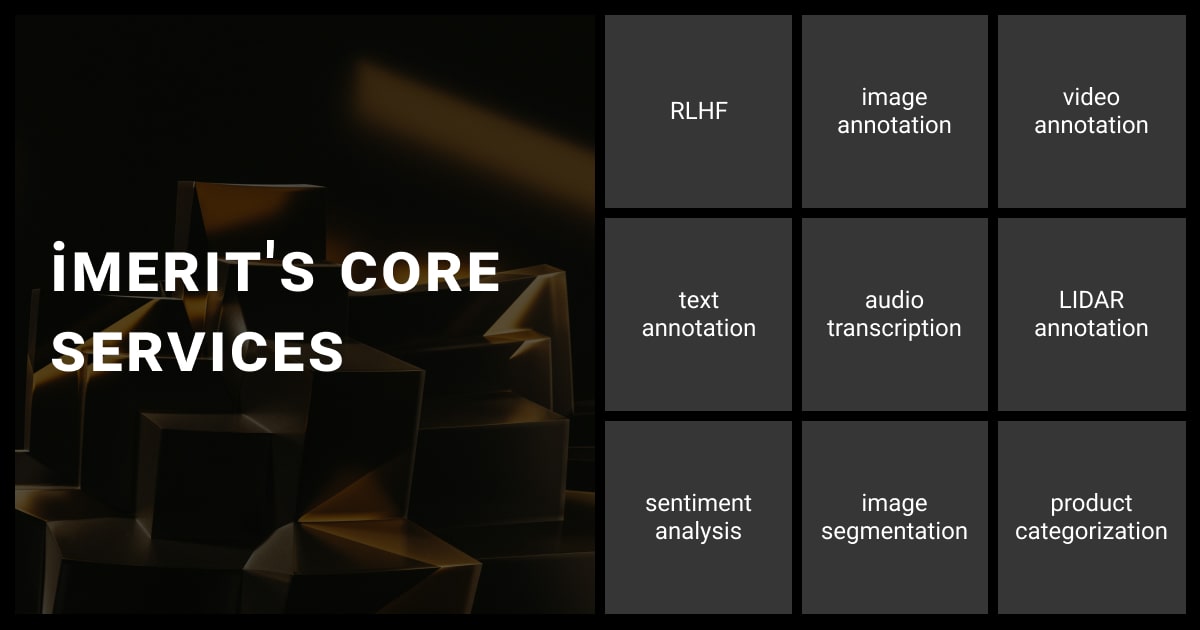
iMerit specializes in data labeling services for generative AI, computer vision, NLP, and content services. Their key focus areas include:
Reinforcement learning from human feedback (RLHF) for LLMS and LVMS
Image, video, and text annotation
Audio transcription
LiDAR annotation
Sentiment analysis
Content moderation
Product categorization
Image segmentation
Their annotators are multilingual, with a majority speaking English and based in India. Additionally, they have teams in the US, Bhutan, Germany, and Latin America, capable of handling multilingual ML projects.
Kili Services and Products
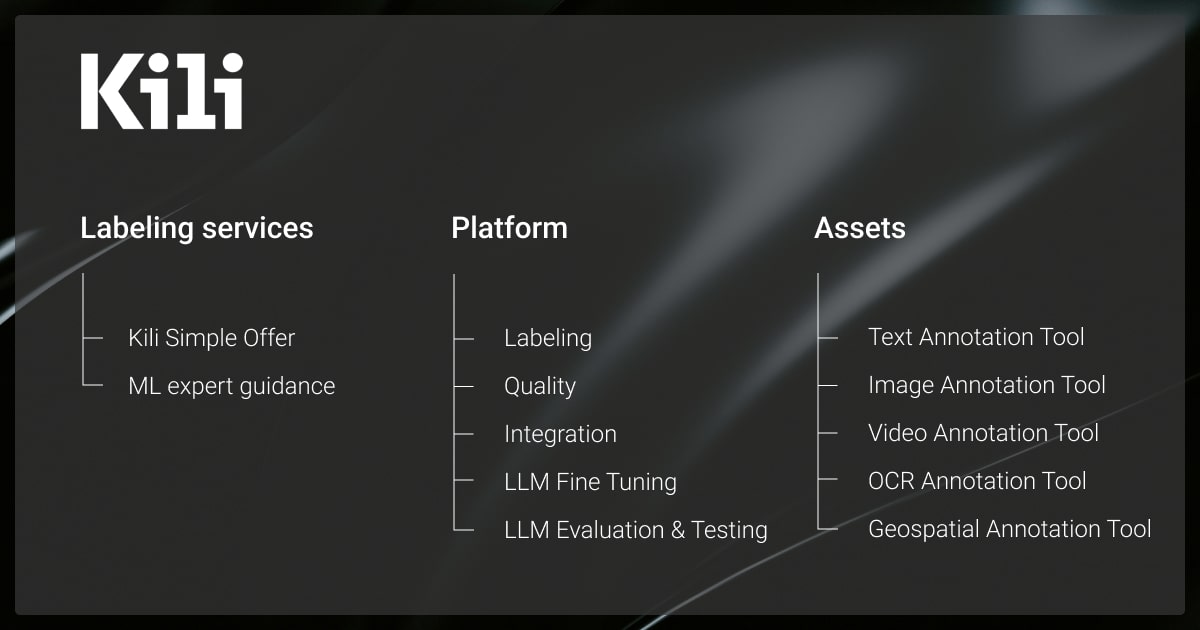
Kili Technology offers a comprehensive data labeling platform and expert services to help businesses build high-quality ML datasets.
Kili Data Labeling Platform:
Supports text, document, image, and video labeling
Includes AI-assisted tools for efficiency
Features quality management and integration capabilities
Managed Expert Labeling Service:
Global network of experienced annotators
Provides quality control, customizable annotation, and real-time oversight
Offers ML expert guidance and consulting services
Kili’s Products:
davinci: An AI tool that accelerates patent drafting and office action responses using generative AI technology.
Pricing Models
Feature | iMerit | Kili Technology |
Pricing Structure | Subscription-based, per task, discounts for high volume | Tiered pricing: Free Plan, Grow Plan (pay-as-you-go), and Enterprise Plan with additional professional services available |
Pricing Details |
|
|
Free pilot | Free Analysis | Free Plan is limited to 5,000 annotations and 5 collaborators |
Additional Notes | Discounts based on annotator's language and location | Customizable pricing available based on the size and complexity of your ML datasets |
Pricing flexibility depending on the scope of annotation | Customizable pricing available based on the size and complexity of your ML datasets |
Dataset Types
iMerit Dataset Types
iMerit handles image and video datasets for computer vision tasks like object detection, image segmentation, and image classification, essential for autonomous vehicles and facial recognition systems. They also manage text and document datasets, offering services such as NLP, sentiment analysis, and entity recognition. Additionally, iMerit works with audio datasets for speech recognition and transcription tasks.
Kili Technology Dataset Types
Kili Technology supports annotating various unstructured data formats, including images, videos, text documents, PDFs, satellite imagery, and conversational data. It provides dedicated interfaces for efficient labeling and supports LLM evaluation, supervised fine-tuning, and RLHF workflows. Data can be imported (CSV, JSON, image files) and exported (CSV, JSON, TensorFlow Record). Limitations include video annotation (bounding boxes only) and OCR integration.
Data Annotation Tools
iMerit Annotation Tools
For most annotations, iMerit experts use their proprietary tool, Ango Hub, for image, video, and text annotation. While they can work with clients' specific tools, they prefer using Ango Hub in all cases. Additionally, iMerit technology is available by subscription for individual annotation needs.
Kili Technology Annotation Tools
Kili Technology’s platform facilitates high-quality data labeling with AI-assisted automation, allowing adjustments to pre-labeled data. Users can employ their own custom models or utilize built-in AI models like ChatGPT and SAM for automatic pre-labeling, saving time on large datasets.
The platform supports various data types with tools for text, image, video, OCR, and geospatial annotation. However, some automated features are still developing, and complex tasks may require human annotators. Additionally, Kili's focus on its own tools might pose integration challenges with existing systems.
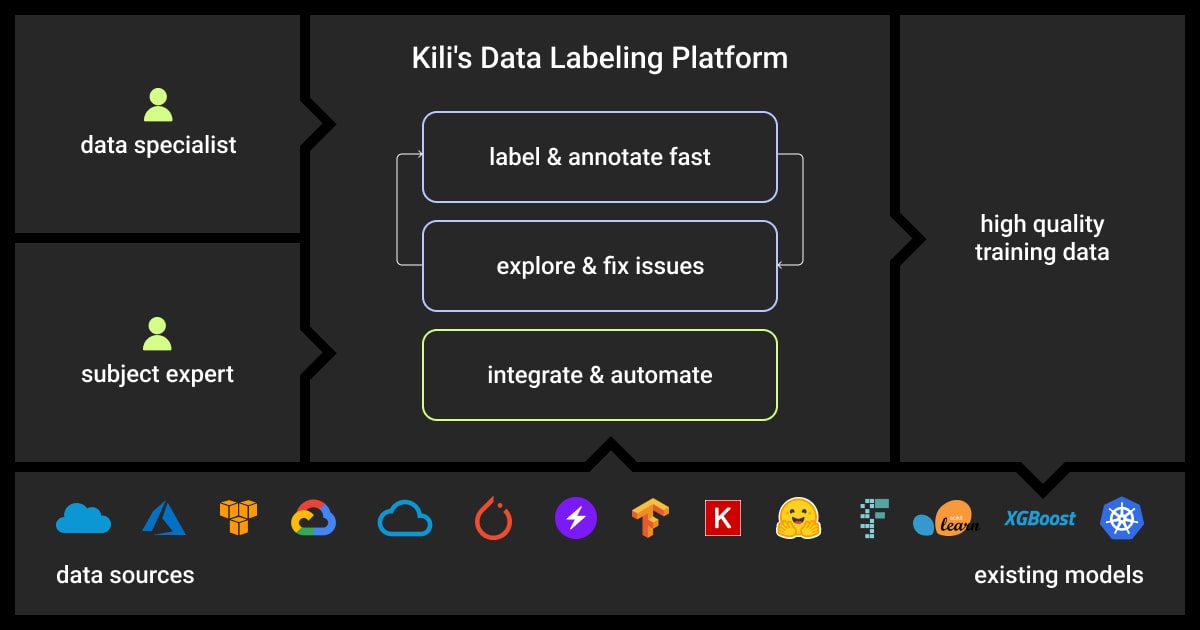
Integrations
iMerit Integrations
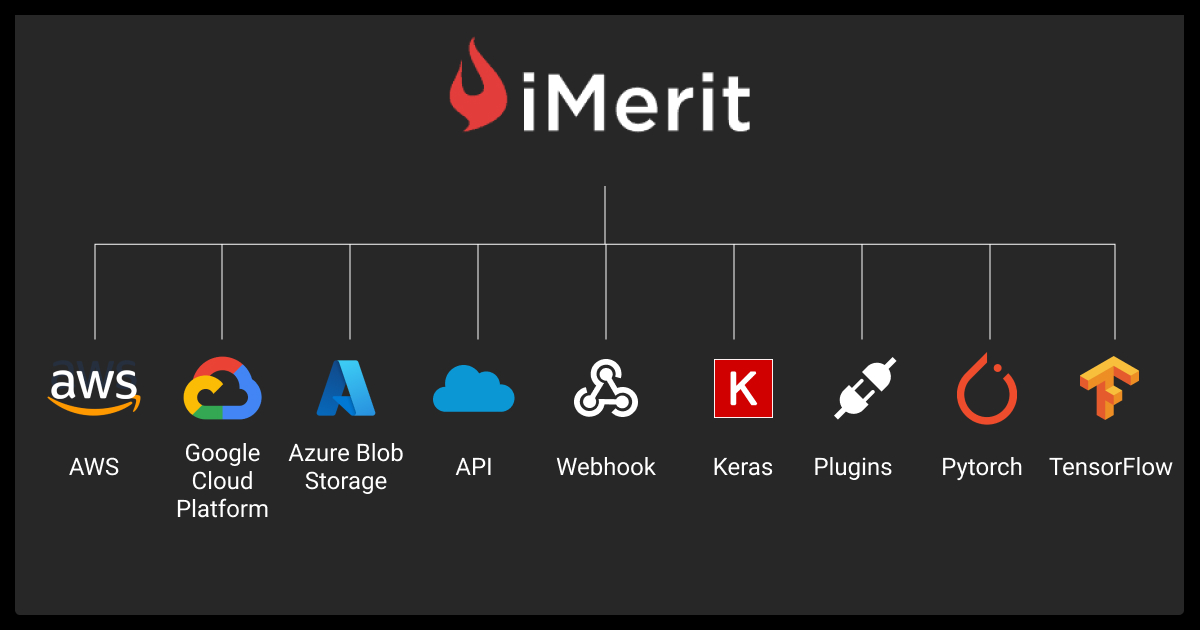
The data labeling company offers no-code integrations, with most deployments happening through APIs and plugins. They can integrate various applications and MLOps platforms, ensuring efficient data pipeline integration even for custom requests.
Kili Technology Integrations
Kili Technology provides tools to enhance data quality, collaboration, and integration with ML workflows. It offers API and Python SDK for programmatic access, supporting major data storage solutions like Amazon S3, Google Cloud Storage, and Microsoft Azure Blob Storage.
This allows seamless data import/export and integration into ML pipelines. Additionally, Kili supports version control, simplifies labeling operations, and integrates with existing ML stacks and datasets. Note that full functionality requires webhooks, API access, and Python SDK, which may be complex for non-technical users.
Annotation Process
iMerit Annotation Process
iMerit emphasizes that human annotation is faster and more efficient, despite offering machine-assisted labeling for specific cases. Their main steps for data annotation include:
Consultation with an expert
Trial and annotators’ training
Workflow customization
Feedback cycle
Evaluation
You can be involved in the annotation process at any stage you choose.
Kili Technology Annotation Process
The company provides a variety of services and approaches to data labeling for machine learning, which depends on the specific service you choose:
Platform-Based Annotation
Easy Start: User-friendly platform with customizable interfaces.
Pre-Annotation: Utilize your custom models for initial labeling.
Job Types: Supports classification, detection, relation, and transcription.
Quality Assurance: Integrated quality metrics and detailed reports to ensure high accuracy.
Integration: Compatible with Amazon, Google, and Microsoft cloud storage.
Kili Simple Annotation Process
Upload Data: Submit a sample with your guidelines.
Quick Start: Receive a transparent quote and start promptly.
Progress Monitoring: Real-time tracking of labeling progress.
Guaranteed Accuracy: Delivered datasets with a 95% accuracy guarantee, with re-annotation offered if needed.
ML Expert Guidance
Detailed Requirements: Share your project specifics and workflows.
Iterative Feedback: Review and refine through calibration batches.
Active Learning: Enhance data quality continuously with integrated model feedback.
Kili Technology ensures efficient, accurate, and scalable data labeling for all project complexities.
Quality Assurance
iMerit QA
During every step of data annotation, iMerit uses various reports, dashboards, and tracking systems to ensure efficient project management, identify troubleshooting needs, and track KPI metrics. To guarantee high-quality annotation, they employ several techniques:
Setting a gold standard during mini-sets
Using annotator consensus
Applying scientific methods for label consistency
Subsampling
The solution architect randomly selects a sample of the dataset, around 5-10% of the total labeled data, to check for errors. AI-based frameworks assist annotators in reviewing labeled datasets multiple times before project submission.
Kili Technology QA
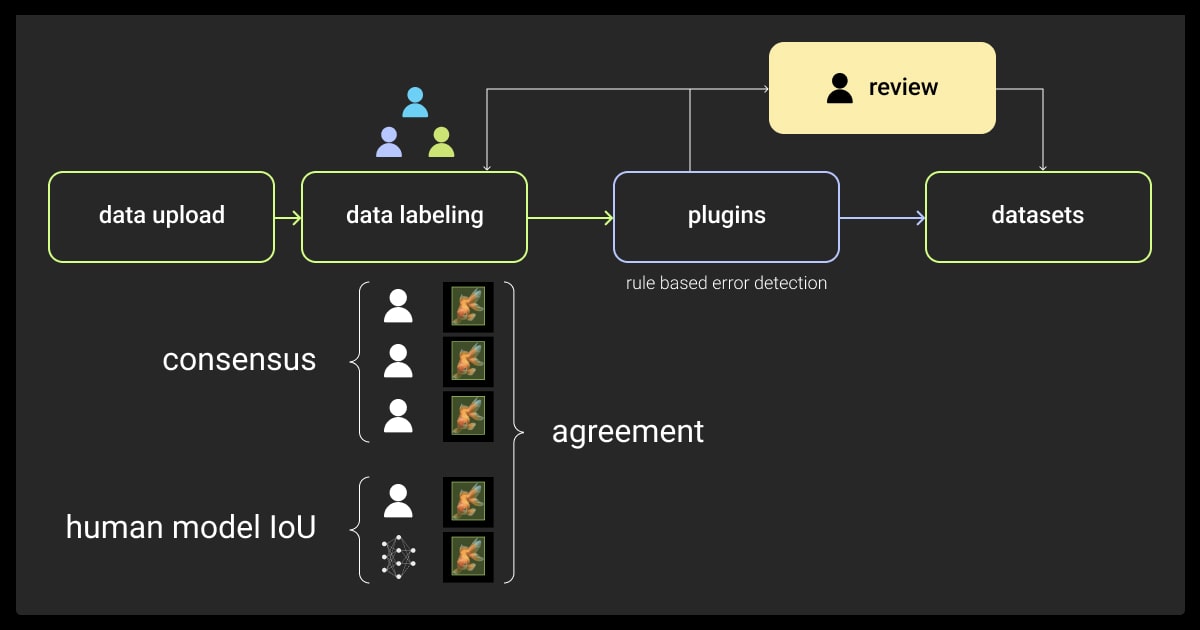
Ensuring annotation quality is vital for successful data projects. Kili Technology provides robust QA tools:
Consistency Checks: Automated reviews to identify and resolve discrepancies.
Review and Feedback: Iterative feedback loop for continuous improvement.
Quality Metrics: Metrics like inter-annotator agreement and annotation speed to monitor performance.
Kili guarantees 95% accuracy, offering:
Low-Error Datasets: Reliable and representative data.
Data Cleaning: Addressing quality, bias, and imbalance issues.
Programmatic QA: Automated error detection and active learning for high-quality annotations.
For optimal results:
Continuous Feedback: Ongoing team collaboration.
Targeted Reviews: Random and specific data checks.
Quality Metrics Integration: Tracking progress and improvements.
Security and Data Compliance
Feature | iMerit | Kili Technology |
Access Controls |
|
|
Worker Screening | Security Manager trains employees | Comprehensive worker screening process |
Compliance |
|
|
TL;DR
Aspect | iMerit Pros | iMerit Cons | Kili Technology Pros | Kili Technology Cons |
Services | Comprehensive range of services | Higher cost for premium services Additional charges for custom output exports | Global workforce of annotators Professional consulting from ML Engineers | High cost for expert services Limited flexibility in custom workflows and tools |
Tools | Advanced features with proprietary tool Ango Hub | Steeper learning curve for advanced tools | AI-assisted pre-labeling Integrated quality metrics | Automated features in development Limited video annotation support |
Pricing | Monthly subscription with flexible pricing based on volume, language, and location High-volume discounts | One-time charge for custom data export Total cost depends on project scope and personnel involved | Free plan for beginners Flexible Grow Plan Custom enterprise pricing | High cost for Professional Services |
QA | Rigorous QA processes with multiple layers of quality checks | Time-consuming QA processes | Consistency checks and feedback loops 95% accuracy guarantee | Limited integration with existing workflows |
To sum up, Kili Technology is ideal for businesses seeking a robust, AI-assisted data labeling platform with seamless integration into existing ML workflows. iMerit, with its extensive end-to-end data annotation services, is better suited for large-scale projects requiring diverse annotation types across various industries.
And if you’re looking for a vendor with these qualities:
No commitment
Flexible pricing
Tool-agnostic
Data-compliant
Try our free labeling pilot to experience our service firsthand and see if we’re a match.
FAQ
Which company offers a better combination of experience and cost for data labeling: iMerit or Kili Technology?
iMerit might offer a better combination of experience and cost, especially for large-scale projects, due to its long history and extensive global workforce. Kili Technology, while newer, offers competitive pricing plans and advanced AI-assisted tools.
How do these data labeling companies compare in terms of data labeling accuracy and turnaround times?
Both data annotation companies guarantee high accuracy, with Kili Technology offering a 95% accuracy guarantee and advanced QA metrics. iMerit is known for its efficient human annotation processes and can deliver quick turnaround times with its large, experienced team.
If my project requires a significant increase in labeling volume, which company can better scale their workforce to meet my needs?
iMerit is better equipped to scale quickly for large increases in labeling volume, thanks to its extensive workforce of over 5000 employees spread globally.
Which data labeling company offers more responsive customer support?
Both companies provide strong customer support, but iMerit's long-established presence and larger support team might offer more responsive and personalized customer service.
Written by
Karyna is the CEO of Label Your Data, a company specializing in data labeling solutions for machine learning projects. With a strong background in machine learning, she frequently collaborates with editors to share her expertise through articles, whitepapers, and presentations.

